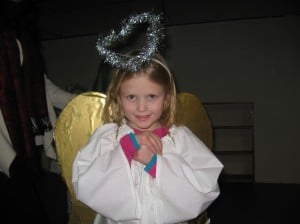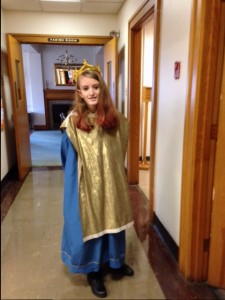This post was originally published on the Episcopal Café web site on January 21, 2010, and has been reprinted in my church bulletin for several Christmases. When I wrote it, my kids were much smaller, Christmas Eve more challenging as we aimed to do all the important things—prepare food, pick up those last few groceries—while shepherding three overexcited, wired kids through a pageant and dinner to follow. This year, two of my children are still in the pageant, but no longer as tiny, confused angels or shepherds. Leah will sing a solo as one of the three kings, while Ben will be her page (which involves driving her wooden camel on wheels down the aisle). Several friends who have read this piece have shared their own “pageant moments” with me—moments when the Christmas pageant, so imperfect given its reliance on so many young, excited, tired children, was transformed from the final hurdle to get through to a startling reminder of the core truth of Christmas: God loves this crazy, imperfect world, and the unruly, imperfect people who inhabit it, enough not only to take on flesh to live with us, but also to invite us to join God’s work of transforming the world with astonishing, reconciling love. May you have your own “pageant moment” this Christmas, if not during an actual pageant, then during some other moment when the light of Christmas shines clear through whatever murk you may be dwelling in. Merry Christmas!
Confession: I could really do without the annual Christmas pageant.
The children’s ministries director at my suburban Episcopal church says this is a common sentiment among those in her position, for whom the pageant can be crazy-making, what with the involvement of dozens of small beings, some of whom rarely come to church otherwise and don’t know the altar from the aisle, who need to be costumed and corralled and choreographed, all at dinnertime on Christmas Eve, one of the most excitement-filled, overscheduled, oversugared, meltdown-inducing days of the year. Our director, though, insists that she loves it all, and it shows in her patient handling of errant camel drivers and weeping angels who can’t find their halos.

But as the mother of three of those children on the brink of meltdown, I always dread the pageant. Sure, it’s cute and all, and it helps my kids understand, in a very concrete way, why we celebrate Christmas. But after weeks of baking, shopping, wrapping, and decorating, I’m ready to kick back with a glass of wine to admire the tree and stare into the fire. I am ashamed to say that I often see the pageant as the final hump to get over, the last thing to check off my to-do list so that I can actually celebrate the holiday instead of preparing for it.
This past Christmas Eve, it looked as if the pageant was going to be even more difficult to sit through than usual. A snowstorm the weekend before meant that the kids had no dress rehearsal. There were long, awkward pauses as we all waited for solos that both the singers and the organist seemed to have forgotten. There were sidelong glances and inscrutable hand gestures as the kids tried to pantomime to each other what they were supposed to be doing. I was anxious for it to be done so we could feed the kids and get them in bed by 9 p.m.—later than normal but early enough that they might make it through the following day without collapsing into puddles of misery. My stomach was growling in anticipation of Christmas Eve dinner. I sat slightly slumped over, chin in hand, as I went through my mental checklist of the children’s gifts, making sure I hadn’t forgotten to wrap something vital and that everyone was getting an equal number of presents.

And then, Gabriel delivered the infant Jesus (played by a three-month-old baby girl) into Mary’s arms, and Mary and Joseph began to sing. And everything—the pageant, my attitude—was transformed. I was so caught up in what was happening up front that I sat glued into the same position, slumped over with chin in hand, for the entire song, afraid that the slightest movement would break the spell.
They sang “O Holy Night,” and it was remarkable for many reasons. The teenagers playing Mary and Joseph had beautiful voices, certainly, but it was more than that. They took turns harmonizing—one would sing the melody while the other sang harmony, and then they would switch roles, seamlessly, as if it were the most natural thing in the world. They worked together, each bringing something unique to the song, each willing to step back into harmony or step forward into melody as the song demanded. Just as two unprepared but willing teenagers might work together to raise the surprising gift of a baby—one stepping forward to lead when the other is scared or weary, each giving what they can when they are able, the sum of their efforts worth far more than their individual contributions.
And how poised they were. Not confident exactly. There was uncertainty in the way they held themselves in this pageant that had, thus far, not gone quite as planned. Joseph stood with hands clasped in front of him, while Mary took care to hold the baby in her arms just so, stealing frequent glances down and occasionally doing a deliberate little bounce to soothe her. This was all new, this singing a song with difficult harmonies in front of several hundred hushed spectators, with a living, breathing baby alongside and without adequate rehearsals. They seemed apprehensive but not afraid, aware that things could go badly—the baby might wail, the harmonies might be off—but eager nonetheless to do what was being asked of them. Just as, I imagine, Mary and Joseph might have felt two thousand years ago in Bethlehem, two young people who were asked to accept and love a baby they did not expect, and no ordinary baby at that. A baby born among animals and visited by kings.
I did not want the song to end, but it did (probably to the relief of Mary, holding the baby who miraculously stayed calm and quiet for the entire song and the remainder of the pageant). The pageant continued, with the wooden camels clickety-clacking their way down the stone-slabbed aisle, and the proud parents snapping photos of the assembled angels and shepherds during the Peace, and the restless children asking, “Is it almost over?” through the Eucharist and final hymns.

We got through the pageant and Christmas Eve dinner, and the wildly anticipated Big Day itself. We had a wonderful week with no work and no school, during which I ignored most chores and allowed myself to really celebrate the holiday after all those weeks of preparing. And now, as I write this, the decorations are back in their plastic bins in the basement, the Christmas gifts have been shelved alongside all the gifts from past Christmases and birthdays, the kids are back at school, and my husband and I are back at work.
But I hold onto the sight of Mary and Joseph singing at the Christmas pageant, not fully prepared but ready enough, a little nervous but nonetheless willing to do what was asked of them. They have become, for me, a symbol of what it looks and feels like to respond to God’s call.
There are two major works that God has called me to thus far: motherhood and writing. In both cases, I have had to do what God was asking me to do despite not being fully prepared, and yet being fully aware of how things could go wrong. My husband and I decided to have biological children even though I have a disabling bone disorder and each child had a 50 percent chance of inheriting it. For five years, I worked at writing a book about what that experience taught me (is still teaching me) about God, human beings, suffering, love, choice and disability, even though publisher after publisher told me it was well-written but not marketable enough.
Today, I have three beautiful children, a book contract and two blogs with appreciative and growing audiences. Every day brings opportunities to get up in front of those willing to listen—my family, my community, my readers—to sing about darkness and light, sin and hope, weariness and rejoicing. I am blessed with many partners—my husband, my parents, my editor, fellow writers, friends who read and respond to what I write—with whom I work in harmony, sometimes leading, sometimes following, always aware that work done in communion with others is more valuable than work done in isolation. Writing and parenting can both be tremendously isolating, and even though that isolation is sometimes necessary (I keep my cool through many loud, contentious dinner times by reminding myself that later, once the kids are in bed, I can sit down alone to write), if I write or parent without engaging with the wider world, then my work becomes self-indulgent.
As I sing, offering my words and my work, the baby’s wailing might drown me out, I might sing the wrong notes, or I might be unsure of what I’m supposed to do next. But I’ll sing anyway, not fully prepared but ready enough, a little nervous but willing nonetheless to do what is asked of me.











